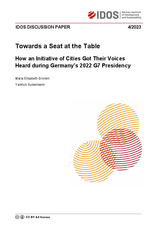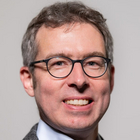Towards a seat at the table: how an initiative of cities got their voices heard during Germany’s 2022 G7 presidency
Gronen, Maria Elisabeth / Yannick SudermannDiscussion Paper (4/2023)
Bonn: German Institute of Development and Sustainability (IDOS)
ISBN: 978-3-96021-205-8
DOI: https://doi.org/10.23661/idp4.2023
Price: 6 €
In the past, both researchers and policymakers have often underlined the important role cities have to play in reaching the objectives of the Paris Agreement and the 17 Sustainable Development Goals (SDGs). Meanwhile, city networks have become increasingly active in approaching international institutions and getting their voices heard. Among them are the Urban7 Group – a recently founded group of city associations from G7 countries advocating for a stronger involvement of cities in G7 policymaking. The discussion about who has a voice in the G7 and what role cities can potentially play in it is significant. The G7, despite being somewhat contentious, remains a highly relevant forum both in terms of the negative contribution of its members to global sustainability crises (such as climate change) and their collective economic capability to address the crises. In the past, references to the role of cities were largely absent from G7 official documents; this changed during Germany’s G7 presidency in 2022. Based on a document analysis and semi-structured interviews with ministry officials and city network representatives, this paper investigates how, in 2022, the Urban7 Group was involved in the G7 process, and which actors and contextual factors had an impact on the width and depth of this involvement. While the German presidency opted not to directly involve the Urban7 Group as an official G7 engagement group, the group nevertheless gained access to ministerial negotiations, in particular those of the new G7 track on urban development. The paper finds that this engagement was facilitated by pre-existing contacts with ministerial officials as well as changes in the delineation of ministries following the German federal election in late 2021 that led to changes in political leadership and the formation of a new ministry to take responsibility for urban development. The paper closes with critical reflections on the 2022 process, recommendations and potential avenues for future research.


